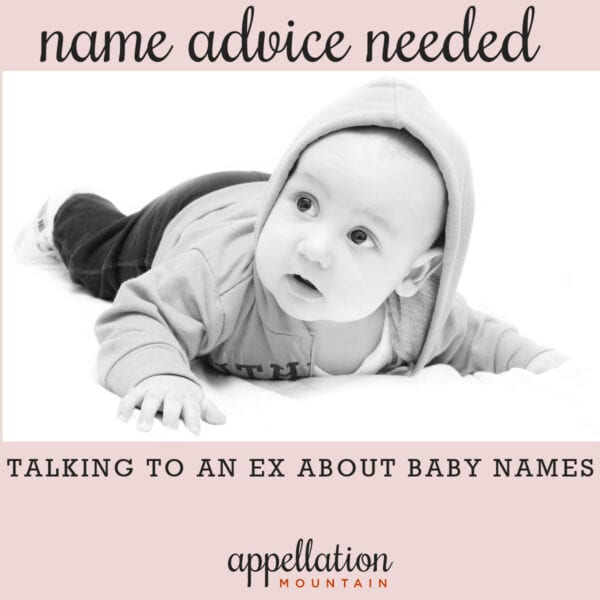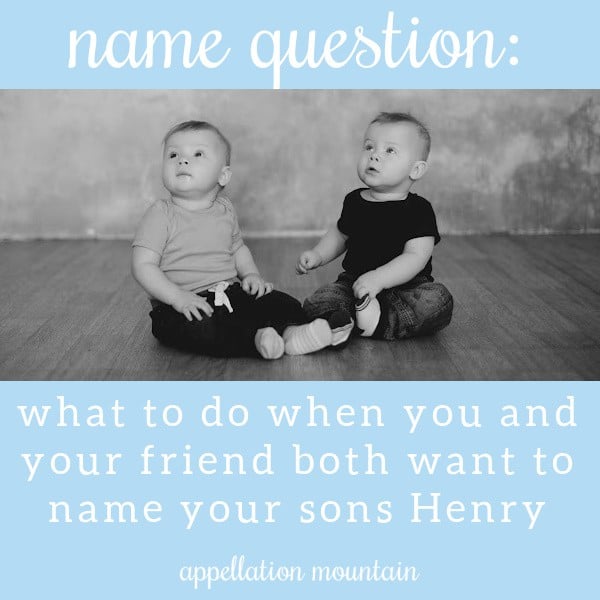
For many years, for most American families, this wasn’t a conversation. Women married men. They took their husband’s family surnames. Their children shared that name, too.
I’d say “end of discussion” except … it wasn’t even discussed. It was simply the way of the world.
Now, though, we have choices.
Even if you ultimately default to the twentieth century American tradition, it’s good to recognize that choosing your child’s last name offers alternatives. And some of those options might be exactly what your family needs.
I’m listing these from the most traditional to the least, though obviously, there’s some room for argument.
EVERYONE TAKES THE FATHER’S SURNAME
In the America of Leave it to Beaver, the entire family shared one surname: his. We don’t know if Mrs. Cleaver felt like she was missing out, because there simply wasn’t another alternative.
There’s an ease to this that feels enviable. You’re a unit – the Cleavers.
And yet, it requires women to surrender a part of their identities at marriage. For some women, this is a non-issue; they’re early in their careers or not attached to their family names. Maybe even eager to shed them, for any number of reasons.
But for others? This is painful. They’re professionally well-established using their birth names and the switch feels awkward. Or they’re the last in their family line, and giving up the surname feels like a painful loss, rather than something gained.
While we tend to associate this with the most traditional families, plenty of same-sex couples do agree to take one partner’s surname, too. It’s not necessarily a conservative or retro perspective to feel like sharing a family name matters.
THE KIDS SHARE DAD’S SURNAME, BUT MOM KEEPS HERS
Emily Blunt marries John Krasinski. Their kids are Krasinski, but she remains Blunt.
This is so common that it’s hardly complicated. Maybe the mom is called Mrs. Krasinski from time to time. But there’s no practical barrier to managing a family with two surnames. And retaining your birth name feels right for many women.
And yet, it does leave the mom the odd one out. Most families don’t seem to give this a second thought – most of the time. But it does need to be explained. I met a new family recently. “My daughters are Ella and Marie Jones. I’m Emily Smith.” No big deal, but also not quite seamless.
Again, same-sex couples might make a similar choice, particularly if continuing a family surname matters more to one partner.
USE THE SECOND SURNAME AS A MIDDLE NAME
Nothing says both surnames require equal billing. It’s very possible to give your child the unused surname as a middle name – think Mason Smith Jones, or Mason William Smith Jones.
The downside is that middle names can sometimes disappear. We might choose to emphasize them, of course. But family surnames have been stuck in the middle spot for ages, and they’re often reduced to an initial – Mason S. Jones – or dropped entirely – Mason W. Jones.
Still, it preserves both family names in your child’s identity. While it’s most common for the mother’s name to take the middle name spot, there’s nothing that says it has to be that way, either.
I suspect this pleases family genealogists, eager to ensure that future generations can trace their third cousins. And it might feel more balanced, including both sides of the family in your child’s name.
HYPHENATE
This often feels like the most equitable approach. Except … who hyphenates?
The family can be Andrew Jones and Jennifer Smith, parents of Mason Smith-Jones and Ella Smith-Jones.
One or both parents might hyphenate, too. Again, we tend to put the mother’s name first, but of course, there are no rules.
The downside, of course, is that hyphenated names can be complicated. They flummox databases, confuse the person alphabetizing nametags and diplomas. They’re misrecorded.
And yet … convenience isn’t necessarily the best way to make a naming decision. If keeping both of your names matters, and having a family surname matters, too, then this is a viable option.
EVERYONE TAKES A MUTUALLY AGREED UPON SURNAME
Sometimes this means that Andrew Jones becomes Andrew Smith – taking his partner’s surname.
Or it might mean something akin to hyphenating, taking a new surname composed of pieces of both family names: Jennifer and Andrew Smithjones. Or Jennifer and Andrew Jonsmith. It requires more paperwork – maybe – but neatly sidesteps the challenges of hyphens and databases and “does this go under J for Jones or S for Smith?” debates.
Some couples choose to start fresh, with a surname that represents their new family. This feels both incredibly appealing and intensely challenging. The best case scenario might be surnames like Evergreen, signalling commitment but not seeming particularly invented.
On the other hand? Kate Winslet’s third husband gave himself the surname Rocknroll. She stuck with Winslet – and their son took her last name, too.
ALTERNATE
Absolutely nothing says that partners have to share a surname. That goes for siblings, too!
You might give all of your daughters their mother’s surname, while all of your sons take their father’s surname. (Or vice versa.) A couple could alternate – their firstborn is Mason Smith, and their second is Ethan Jones.
In an age of divorce and remarriage, siblings with different surnames feels unremarkable. Might you get a few questions? Sure. But maybe fewer than you’d imagine.
USE ONE SURNAME AS THE FIRSTBORN’S GIVEN NAME
Remember Miranda Hobbes of Sex and the City fame? She wasn’t in a committed relationship with Steve Brady when their son was born. They name their son Brady Hobbes.
It’s a twist on a longtime tradition of using the mother’s maiden name as part of a child’s given name.
When the couple finally did marry, of course, they were Steve Brady, Miranda Hobbes, and Brady Hobbes. But she could’ve been Miranda Hobbes Brady or even Miranda Brady, and their son’s name still worked beautifully.
One shortcoming: it solves the problem for your first child. Subsequent children mean revisiting the issue anew.





I once had a lovely conversation with my boyfriend over surnames, and he is very firm that any children get his surname. I’m perfectly fine with this for several reasons, but I was curious why he felt so strongly.
Ultimately, it’s that the lady half of the couple (hello!) is (probably) going to be growing the child and giving birth to them. There’s a level of connection that he can never match. He didn’t carry the kid, he didn’t birth the kid, but he can mark the kid with a name to indicate “yes, this is mine. This child is mine too.” Especially when so much of childcare is associated with women!
He phrased it much nicer than I am now, haha.
(He also does not care in the slightest what other families do, it’s not a “this is traditional and you must do it.” if another family names their kids by augury, doesn’t matter, this is specifically for him.)
That’s SUCH an interesting perspective, Ducky! Thank you for sharing it.
And you know … all naming decisions are specific to the family. I’m fascinated by how every family has certain habits and practices that make ALL the sense in the world in our home, but surprise outsiders. If we all store our extra towels someplace different, then really, we’re all going make wildly different decisions about something as significant as naming.
Since it was suggested, I dislike the idea of using the child’s gender to determine whose last name they get as it adds another “gendered” aspect to one’s name (which wouldn’t be a good thing for those with different gender identities).
That’s fair. Emily Fair Oster, the Brown economist, has a great story: when she was born, her parents flipped a coin to see which last name she would take. Fair is her father’s surname; Oster, her mother’s.
This is something we are actively struggling with as we prepare to adopt our first kiddo. I’ve always been irked by the tradition of taking the husband’s name. I don’t have a strong attachment to my own last name, either. We talked about the idea of merging our last names (either by hyphen or invented portmanteau), but ultimately decided that we would each keep our own last names when we got married, knowing that we would have to revisit the conversation if and when we had kids. Well, that time is rapidly approaching, and it’s definitely been a struggle. Neither one of us wants to go through the effort to change our own names, but neither of us wants to be the one with a different last name from our kiddo. We refloated the idea of the combined name, but (1) some of our parent friends have suggested it might make paperwork challenging, and (2) we get quite negative responses from a lot of people that think it’s ridiculous (I still really don’t understand why). Because of those reactions, we’re now aiming to just hyphenate for the kiddo, and to retain our own last names individually. The resulting hyphenate will be long and not especially attractive, but it seems like the most equitable solution given where we stand.
Anyway, that was a long reply, but I guess my point is that it’s tough to navigate this conversation when the husband’s last name has been the default for so long! There are so many landmines that I didn’t even think about when we started talking about it years ago.
YES! It is hard, Brenna. I think there’s value in acknowledging that.
We toyed with the idea of a portmanteau, but nothing really felt right. As it happens, my surname was my stepgrandfather’s last name, and I never knew him. Plus, it was long + unwieldy. So giving it up felt easy. And my husband’s surname felt so appealing – easy to spell and pronounce, but not too common.
I can imagine that if we’d settled on a mash-up of our surnames, we’d have gotten some looks. Possibly tears from some older relatives. BUT at the time, we knew a handful of couples who had gone that route, which made it easier to contemplate.
We are one of those liberals!
Both my partner and I have different last names, and while I was pregnant I really advocated for our son to take my last name. It’s ridiculous to me that he the default is the man’s name, additionally, I liked having the freedom to pick and discuss which last name sounded/ looked better with my son’s first name.
Ultimately, we gave our son my last name and his middle name is his father’s mother’s maiden name. I love it – so much female representation in his name!
I guess what bothers me is that no matter what, the last name comes from a man. Right? Like I have my father’s last name or my husband’s. And even if I am given my mom’s last name, it belonged to her father, not her mother. And so on. There is no origin story for female surnames, at least not in English. There is no “Anndaughter” like there is “Johnson.” Talk about a reminder that in a past that isn’t too distant women were legally considered property.
Unless you can trace the “unbroken male line” for a few centuries, this isn’t completely true. You might have people who adopted maternal surnames for several reasons (illegitimate children, the mother’s family was more important, or adopting a new name altogether via immigration for example). If you go back long enough, poor people didn’t have surnames, or just took the name of their village / profession, for example.
Also, if you’re born with a name, that name is yours regardless of where it came from. If you’re named Mary after your aunt, Mary is now YOUR name.
Also, several English surnames are matronymic in origin i.e., they come from a female ancestor. Some examples: Emmet (from Emma), Madison (Maud’s son), Malkin (Mary)… some occupation surnames are also feminine in origin, e.g. Weaver (weavers were normally women).
Definitely the traditionalist here. We all have my husband’s last name and it’s never bothered me. I like the feeling of being “the B___’s” and being automatically paired with my husband whenever I introduce myself. Everyone knows I belong to him and that he belongs to me!
My maiden name could never be used as a first name and I’d rather give my kids family names from my side than having it in the middle. I have, however, been briefly tempted to use my mother’s maiden name for one of our boys since it could probably work in the middle. It was a nice thought but definitely would vetoed by my husband (he hates surname names).
I know a few women who hyphenated their last name with their husbands’ and the kids got just his. Most people I know take the husband’s last name by default.
So we are the boring ones who all have my husband’s name.
Originally I intended to keep mine legally but give all the kids his (and go by “Mrs.L” in everyday usage), but we were living overseas when our eldest was born and were told by our employer/sponser that having different last names would complicate the baby’s paperwork and might jeopardize getting his US citizenship or visa to stay in our host country. So I changed my name a few months before the baby was born.
In my family, my spouse and I have different last names and our kids’ have his last name, with mine as a second middle. I’m glad that I kept mine, especially as I currently feel sort of drowned in mother/wife/pandemic-default-parent mode; it feels like keeping a claim staked in my own identity. We also considered my last name as a kiddo first name (sounds like Roads, but spelled like the scholar), but I’ve had a lot of experience with it being misheard and needing to spell it, so I took it off the lists.
Wrestling with this right now, as we’re expecting our first.
I have a hyphenated last name already, both names come from my dad’s side. My husband has a single last name. We’d initially thought we’d give one of my last names and his last name and hyphenate, but it’s not as sharp of a look as we’d like.
I keep thinking, first baby gets his, second baby gets both of mine. But here’s the thing – my last name is awesome. It’s alliterated, both names with two syllables. It sounds spunky. My husband’s last name is pretty normal. I feel like it’ll cause unnecessary spats between our kids, because our second would get a “cooler” name (I know I’d feel that way, haha).
The other options are just give the kids the same last name, and we choose my husband’s or mine. But then how do we choose? Both our last names would be “terminal” at this point, as his siblings have a different father, and my sister changed her name.
You know … it’s worth considering giving this child AND any future children your double surname. My decision looks traditional – and I suppose it is – but it really came down to sound and style. (Along with the fact that I was, in no way, attached to my surname – which came down from a step-grandfather I never met anyway.)
If it’s okay to choose given names because we love the sound, why NOT surnames? It might over-complicate an already involved decision. But it could also feel very right for your specific circumstances.
Most of my friends are in families where both parents kept their own name, but the baby took the mom’s last name. I know this has to be a very liberal bubble I’m in, but it’s been really interesting to see it happen over and over again.
Alison, that is really interesting. I know LOTS of families where the mom is the odd one out, but very few where the opposite is true. (I’m not sure if I know any, without some other factor playing in.) That said, this has changed VERY quickly. I remember maybe fifteen years ago, a friend having trouble with her insurance at the (large, university-affiliated) hospital where she gave birth because of a difference in surname between her and her son. It’s become completely ordinary since then …
I’m also in a liberal bubble, but this is common among my friends, too! And a growing number of (straight) couples in my world have chosen to have the husband take the wife’s name after marriage.